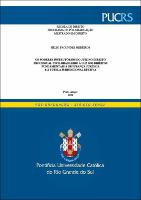| Share record |


|
Please use this identifier to cite or link to this item:
https://tede2.pucrs.br/tede2/handle/tede/10279| Document type: | Dissertação |
| Title: | Os poderes instrutórios do juiz no direito processual civil brasileiro à luz dos direitos fundamentais à segurança jurídica e à tutela jurisdicional efetiva |
| Author: | Medeiros, Hélio Fagundes  |
| Advisor: | Reichelt, Luis Alberto |
| Abstract (native): | Com advento da Constituição Federal de 1988, o Brasil adotou expressamente o Estado Constitucional de Direito Democrático, no qual foram incorporadas as conquistas do Estado Constitucional das Separação dos Poderes (Estado Constitucional Liberal) e do Estado Constitucional Social (Estado de Bem-Estar Social). No Estado Democrático de Direito a função da jurisdição é a tutela de direitos, razão pela qual o juiz tem um papel mais ativo na relação processual, por vezes dotado de diversos poderes, especialmente de poderes instrutórios. Nesse contexto juiz, é um agente estatal que possui a responsabilidade de concretização de todas as gerações, de direitos fundamentais. Esse incremento dos poderes do juiz, especialmente de poderes instrutórios, está diretamente vinculado com a divisão do trabalho dos sujeitos processuais no processo, visto que gera uma relação de tensão entre dois grandes valores do processo civil, o valor efetividade e o valor segurança. Assim, se por um lado o juiz tem o dever de prestar uma tutela jurisdicional efetiva, por outro, as partes possuem direito a um processo justo em que os seus direitos processuais fundamentais relacionados à segurança jurídica sejam respeitados contra o exercício arbitrário de poder. Os poderes instrutórios é uma técnica processual que representa muito bem este tensionamento, razão pela qual é preciso que sejam estabelecidos critérios para o seu exercício, levando em consideração o conteúdo dos direitos fundamentais referidos. Desta maneira, nessa pesquisa serão estabelecidos os pressupostos para aplicação da produção da prova de ofício pelo juiz a partir da efetividade e da segurança jurídica. |
| Abstract (english): | With the advent of 1988 Federal Constitution, Brazil expressly adopted the Constitutional State of Democratic Law, in which the achievements of the Constitutional State of Separation of Powers (Liberal Constitutional State) and of Social Constitutional State (Welfare State) wereincorporated. In the Democratic State of Law, the function of jurisdiction is the rights protection, being the reason why the judge has a more active role in the procedural relationship, sometimes endowed with different powers, especiallywith instructional powers. In this context, the judge is a state agent who has the responsibility to accomplish all generations of directly associated with the work division of the parties in the process, since it generates tension between two great values of civil procedure, the value of effectiveness and the value of security. Thus, if on the one hand the judge has the duty to provide an effective judicial protection, on the other hand, the parties have the right to have a fair process in which their fundamental procedural rights, especially the ones which are related to judicial security, are respected against arbitrary exercise of power. Instructional powers are related to a procedural technique whichnables the judge to provide an effective judicial protection, through a decision based on in adequate analysis of the facts. However, the instructional powers need dogmatic contours, that is, criteria for their exercise, so as they do not represent state discretion, which is the purpose of this study. Through this research, establishing criteria in the light of the fundamental right to effective judicial protection and in the light of the fundamental right to legal security is the aim to be achieved so as to ensure the legitimate exercise of the instructional powers. |
| Keywords: | Poderes Instrutórios Estado Democrático de Direito Efetividade e Segurança jurídica Instructional Powers State of Democratic Law Effectiveness, Judicial Security |
| CNPQ Knowledge Areas: | CIENCIAS SOCIAIS APLICADAS::DIREITO |
| Language: | por |
| Country: | Brasil |
| Publisher: | Pontifícia Universidade Católica do Rio Grande do Sul |
| Institution Acronym: | PUCRS |
| Department: | Escola de Direito |
| Program: | Programa de Pós-Graduação em Direito |
| Access type: | Acesso Aberto |
| Fulltext access restriction: | Trabalho será publicado como artigo ou livro |
| Time to release fulltext: | 06 meses |
| Date to release fulltext: | 02/12/2022 |
| URI: | https://tede2.pucrs.br/tede2/handle/tede/10279 |
| Issue Date: | 11-Mar-2022 |
| Appears in Collections: | Programa de Pós-Graduação em Direito |
Files in This Item:
| File | Description | Size | Format | |
|---|---|---|---|---|
| DIS_HELIO_FAGUNDES_MEDEIROS_COMPLETO.pdf | HELIO_FAGUNDES_MEDEIROS_DIS | 5.32 MB | Adobe PDF |  Download/Open Preview |
Items in DSpace are protected by copyright, with all rights reserved, unless otherwise indicated.




